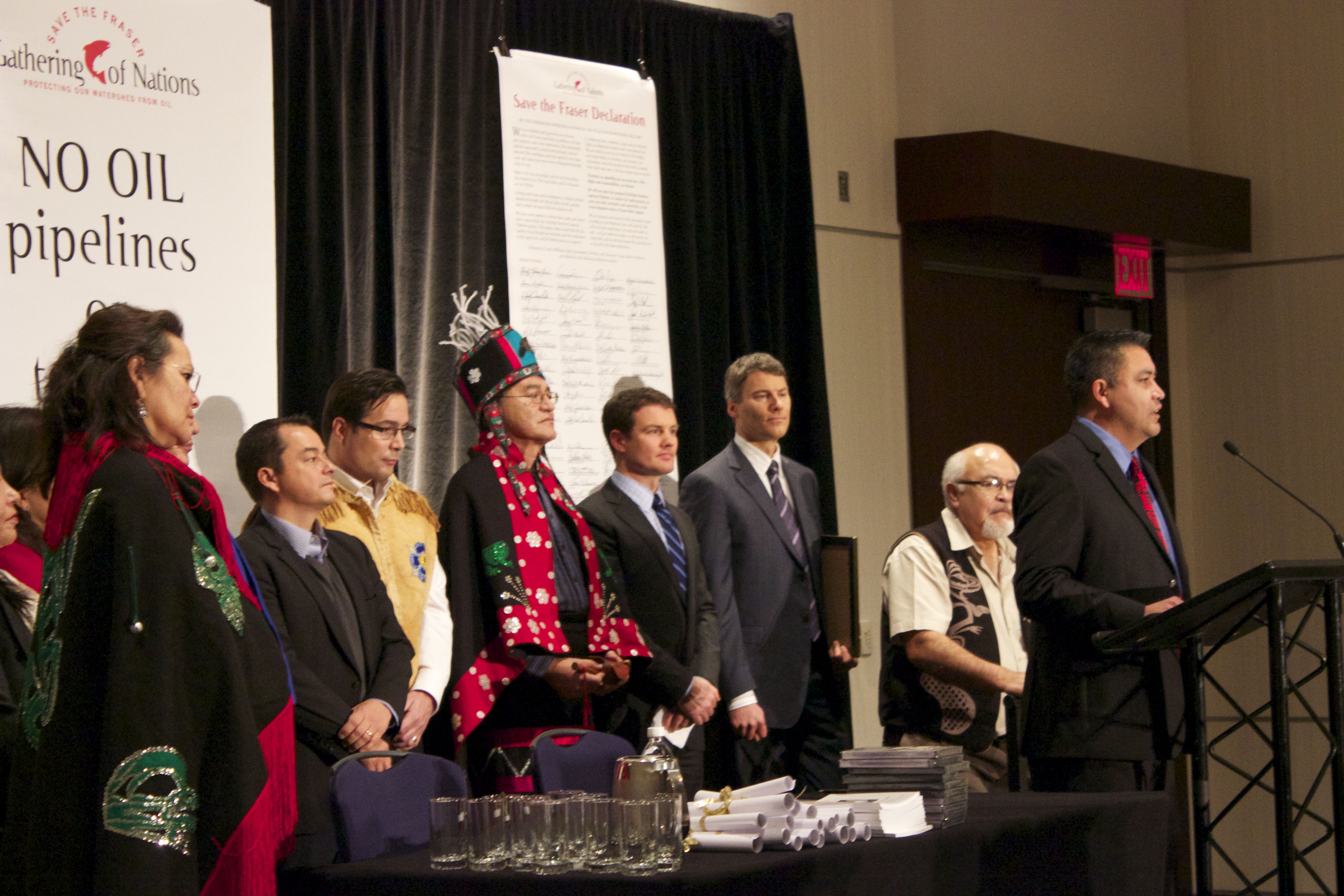
In December 2010, representatives of sixty-one Indigenous nations came together in an historic alliance to protect the Fraser watershed and our coastal waters from the threat of oil spills.The result was the Save the Fraser Declaration, which bans tar sands projects, like the Enbridge pipeline and tankers project, from impacted First Nations’ territories as a matter of Indigenous law. The Declaration states:
 We will not allow the proposed Enbridge Northern Gateway Pipelines, or similar Tar Sands projects, to cross our lands, territories and watersheds, or the ocean migration routes of Fraser River salmon.
We will not allow the proposed Enbridge Northern Gateway Pipelines, or similar Tar Sands projects, to cross our lands, territories and watersheds, or the ocean migration routes of Fraser River salmon.
The support for the Declaration has steadily grown since that time. Today, the majority of Enbridge’s proposed pipeline route is through the territories of First Nations that have banned the pipeline using their own laws. Together, they and other nations opposing tar sands pipelines and tanker projects form an unbroken wall of opposition stretching from the US border to the Arctic.
On December 13, 2012, the anniversary of the Save the Fraser Declaration was marked as First Nations leaders and municipal government leaders stood together in solidarity to speak out against oil pipeline and tanker projects that threaten to pollute our rivers and coastal waters. West Coast was invited to witness the anniversary of the Save the Fraser Declaration, hosted by Yinka Dene Alliance in Coast Salish Territories in downtown Vancouver. The Yinka Dene Alliance has been a driving force behind the Save the Fraser Declaration since its inception.
At the anniversary ceremony, Vancouver Mayor Gregor Robertson proclaimed December 13, 2012 “Save the Fraser Declaration Day” in the City of Vancouver, recognizing the solidarity between the City and First Nations who depend on an oil-free coast and Fraser River for the health of their communities. Smithers Mayor Taylor Bachrach also spoke at the event, affirming his support and recognition of the Declaration, standing alongside Wet’suwet’en hereditary chief Na’Moks.
In addition, the Tahltan Central Council, the Tahltan Band Council and the BC Metis Federation formally declared their support for the Declaration by adding their signatures. Yinka Dene Chiefs Jackie Thomas of the Saik’uz First Nation, Dolly Abraham of Takla Lake First Nation and Fred Sam of Nak'azdli First Nationwere joined by National Chief Shawn A-in-chut Atleo of the Assembly of First Nations (AFN), Grand Chief Edward John of the First Nations Summit, Grand Chief Stewart Phillip of the Union of BC Indian Chiefs, and BC-AFN Regional Chief Puglaas (Jody Wilson-Raybould) along with other First Nations leaders, in reiterating that opposition to tar sands pipeline and tanker projects is grounded in First Nations’ inherent title and jurisdiction over their lands and waters.
Municipal recognition of the Declaration
The recognition of the Save the Fraser Declaration by the Cities of Vancouver and Smithers highlights the links between the aims of the Save the Fraser Declaration and the intentions of many BC municipalities. In 2010, the Union of BC Municipalities, representing all local governments in BC, passed resolutions to oppose tar sands oil being shipped in pipelines across northern BC for loading onto crude oil tankers and to oppose to any expansion of bulk crude oil tanker traffic on the Pacific North Coast. In 2012, the Union of BC Municipalities approved a further resolution calling on the provincial government and the official opposition “to use whatever legislative and administrative means that are available to stop the expansion of oil tanker traffic through BC’s coastal waters.” In addition, thirty-six local governments have come out publicly against the expansion of oil tanker traffic on BC’s coast by passing their own council resolutions.
Declaration impacts both Enbridge and Kinder Morgan
The Save the Fraser Declaration has important implications for both the Enbridge and Kinder Morgan tankers and pipelines projects. In July 2012, Tsleil-Waututh and the Squamish Nations on the South Coast signed the Declaration. Both nations are potentially impacted by the expansion of the Kinder Morgan Transmountain pipeline, which would greatly increase crude oil tanker traffic in the Burrard Inlet. Representatives of the Tsleil-Waututh, who are at ground zero for the Kinder Morgan project, opened the December 13th Save the Fraser anniversary ceremony.
Mayor Robertson was emphatic that neither the Enbridge project nor the Kinder Morgan pipeline expansion project ultimately holds economic benefit for Vancouver or the province at a time when we should be transitioning towards more sustainable development.
 Declaration will be enforced
Declaration will be enforced
First Nations’ have rights to issue a ban on oil pipelines and crude oil tankers in their territories, based in their own ancestral laws, in Canadian constitutional law, and in international law. Companies transporting oil in contravention of the Save the Fraser ban open themselves up to potential enforcement actions grounded in First Nations laws and customs, as well as Canadian and international law. Opposed First Nations have stated they are prepared to use all legal means at their disposal to enforce the Declaration. The prospect of a decision by the Joint Review Panel on the Enbridge project that infringes First Nations constitutionally-protected Aboriginal Title and Rights brings with it legal risks that could take years to be resolved.
Municipal recognition, and increasing Indigenous support behind the Save the Fraser Declaration comes as the Enbridge Northern Gateway Joint Review Panel hearings conclude in the north, with oral statements from community members to commence in the New Year, starting on January 4 in Victoria and moving to Vancouver on January 14. The Joint Review Panel has yet to clarify the details of how Aboriginal consultation will be dealt with under its review processes. What remains clear is that whatever the Joint Review Panel recommends to federal Cabinet regarding the project, companies that attempt to facilitate the transport of tar sands crude oil through Save the Fraser signatories’ territories do so at their legal peril.
By Brenda Belak, Staff Lawyer